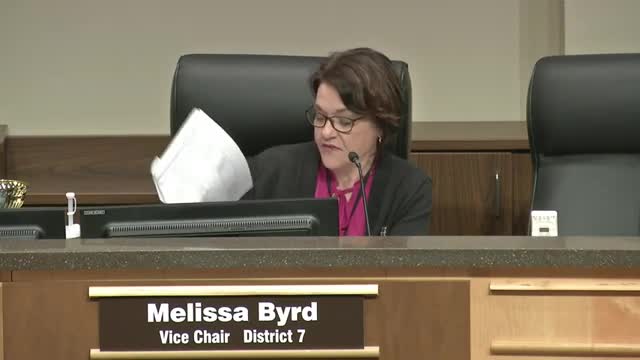Legal ruling forces change to OCPS public-comment rules; board reviews open comment, civility code

Summary
Following a recent federal appeals decision, Orange County legal staff proposed edits to the district's public-comment policy (BEDH) to avoid unconstitutional viewpoint restrictions while retaining decorum rules. Staff and board members debated name-calling prohibitions, personally directed speech and procedures for handling disruptive speakers.
Orange County school district legal staff recommended language changes to policy BEDH at the Feb. 13 work session after an Eleventh Circuit decision narrowed the district's ability to restrict speech in public-comment forums. The discussion focused on balancing free-speech protections and meeting decorum while protecting students and employees.
General Counsel John Palmerini told the board the district's code of civility and prior practice that barred "personally directed" critical comments and profanity could not be written or enforced in a way that amounted to viewpoint discrimination in light of the Eleventh Circuit ruling in Moms for Liberty v. Brevard County School Board.
Why it matters: The court ruled in that case that broadly defined prohibitions on "abusive" or "offensive" speech can amount to viewpoint discrimination and therefore be unconstitutional. That ruling required staff to rewrite portions of BEDH so the district preserves decorum without precluding speakers from stating critical or offensive viewpoints about district personnel or policy.
Key changes proposed and board concerns - Policy timing and format: The draft codifies the pilot practice for open public comment that begins about 1 hour before regular meetings, concluding no later than 45 minutes after it starts unless extended by a board vote. The draft also preserves the pilot's tiered speaker times (1'10 speakers: 3 minutes each; 11'20: 2 minutes each; 21+: 1 minute each) and the prioritized sign-up order (parents/legal guardians/students/employees first; Orange County residents second; others third). The policy retains an electronic sign-up procedure and the current email cutoff for pre-submitted comments (staff noted it was set at 5 p.m. the day before the meeting).
- Civility code and federal-law limit: Palmerini recommended adding a legal caveat to BEDH's civility clause so it reads that speakers must abide by the code of civility "to the extent it does not conflict with the right of speakers to state his or her viewpoint consistent with current federal law." He explained the language is required after the appeals court said restrictions on "abusive" or "offensive" speech are likely unconstitutional if they suppress particular viewpoints.
- Personally directed speech and content about employees or students: The court decision said banning personally directed speech (naming or targeting specific employees) blocked an important form of public grievance. That prompted extensive board debate. Several members urged staff to draft a narrower rule that would at minimum prohibit naming minors and encourage speakers to first raise operational or disciplinary concerns with school administration before addressing the board. Palmerini said he would attempt to craft language that offered a procedural guardrail (ask the speaker to take concerns to administration first) while complying with the court's requirement not to impose viewpoint-based bans.
- Disruptive or obscene speech: Palmerini said the court also stressed that reading book passages or citing explicit content, even if offensive, may be protected speech in a public forum. He recommended the board keep decorum rules but warned they cannot be written so broadly as to block unpopular viewpoints.
Board direction and staff follow-up Board members asked staff to return with redrafted language that: (1) retains a civility expectation but explicitly states it is subject to federal First Amendment protections, (2) explores a narrowly tailored restriction or procedural step for complaints about employees that requires raising the concern with administration before public comment, and (3) clarifies the superintendent's role and staff response when inaccurate or operationally actionable allegations are made.
Ending: No policy vote was held. Palmerini said staff will draft alternative language and return to the board; members signaled concern about protecting employees and minors while ensuring the district complies with federal constitutional law.

